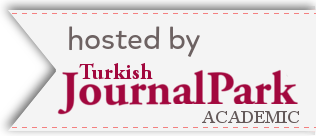The causes and treatments of 47 children with facial nerve palsy experienced in two hospitals in northern Greece
Abstract
Objective: to review and analyze the etiology, management and outcome of facial palsy in children. Methods: retrospective study of 47patients of Northern Greece aged less than 15 years diagnosed with facial nerve palsy from 2000 to 2011. Results: a total of 47 patients (25 female, 22 male) with a mean age of 9 years were included. Causes of facial palsy were infectious (22 patients, 46.8%), Bell's palsy (18 patients, 38.3%), trauma (4 patients, 8.5%), congenital (2 patients, 4.3%), or other (1 patient, 2.1%). The left side of the face was involved in 55.3% of the cases. Facial palsy was more frequent at ages between 6 and 10 years with prevalence 42.6%. Between these ages the most frequent causes were Bell's palsy (45%) and infectious causes (45%). Conclusions: in this study the most common cause of facial palsy was infectious conditions followed by Bell's palsy. In Bell's palsy there was no significant difference in the recovery rate between the groups with or without prednisolone treatment.
Keywords
Full Text:
E206References
May M, Klein SR. Differential diagnosis of facial nerve palsy. Otolaryngol Clin North Am. 1991;24:613–641.
Shargorodsky J, Lin H, Gopen Q. Facial Nerve Palsy in the Pediatric Population. Clin pediatr. 2010;49:411-417.
Pavlou E, Gkampeta A, Arampatzi M. Facial nerve palsy in childhood. Brain Dev. 2011;33:644-650.
Shih WH, Tseng FY, Yeh TH, et al. Outcomes of facial palsy in children. Acta Oto-Laryngologica. 2009; 129: 915 -920.
National Institutes of Health Consensus Development Conference. Neurofibromatosis. Conference statement. Arch Neurol. 1988; 45: 575–578.
Manning JJ, Adour KK. Facial paralysis in children. Pediatrics. 1972;49:102-109.
MayM, Fria TJ, Blumenthal F, Curtin H. Facial paralysis in children: differential diagnosis. Otolaryngol Head Neck Surg. 1981;89:/841-848. Grundfast KM, Guarisco JL, Thomsen JR, et al. Diverse etiologies of facial paralysis in children. Int J Pediatr Otolaryngol. 1990;/19:/223-239.
Evans AK, Licameli G, Brieztzke S, et al. Pediatric facial nerve paralysis: patients, management and outcome. Int J Pediatr Otorhinolaryngol. 2005;69:1521-1528.
De Diego JI, Prim MP, De Sarria MJ, et al. Idiopathic facial paralysis: a randomized, prospective, and controlled study using singledose prednisolone versus acyclovir three times daily. Laryngoscope. 1998;108:/573-575.
Adour KK, Rubayaines JM, Von Doersten PG, et al. Bell’s palsy treatment with acyclovir and prednisone compared with prednisone alone: a double-blind, randomized, controlled trial. Ann Otol Rhinol Laryngol. 1996;105:371-378.
Unuvar E, Oguz F, Sidal M, et al. Corticosteroid treatment of childhood Bell’s palsy. Pediatr Neurol. 1999; 21:/814-816.
Danielidis V, Skevas A, Van Cauwenberge P, et al. A comparative study of age and degree of facial nerve recovery in patients with Bell’s palsy. Eur Arch Otorhinolaryngol. 1999;256:520-522.
Peitersen E. Bell’s palsy: the spontaneous course of 2500 peripheral facial nerve palsies of different etiologies. Acta Otolaryngol. Suppl 2002;549:4-30.
Créange A, Zeller J, Rostaing-Rigattieri S, et al. Neurological complications of neurofibromatosis type 1 in adulthood. Brain. 1999;122:473-481.
